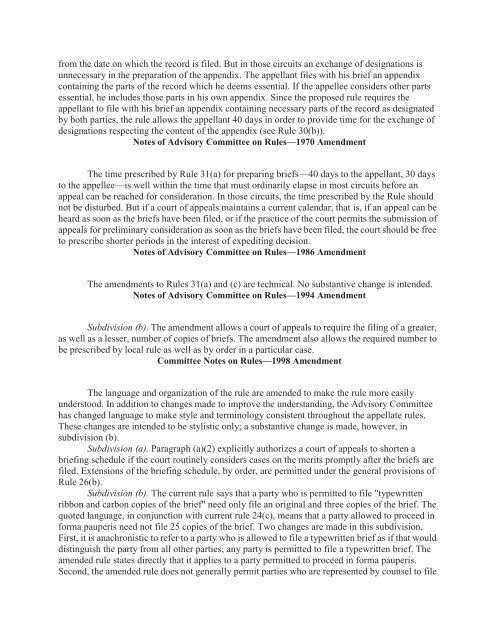Federal Rules of Appellate Procedure 2014-2015, 2014a
Federal Rules of Appellate Procedure 2014-2015, 2014a
Federal Rules of Appellate Procedure 2014-2015, 2014a
Create successful ePaper yourself
Turn your PDF publications into a flip-book with our unique Google optimized e-Paper software.
from the date on which the record is filed. But in those circuits an exchange <strong>of</strong> designations is<br />
unnecessary in the preparation <strong>of</strong> the appendix. The appellant files with his brief an appendix<br />
containing the parts <strong>of</strong> the record which he deems essential. If the appellee considers other parts<br />
essential, he includes those parts in his own appendix. Since the proposed rule requires the<br />
appellant to file with his brief an appendix containing necessary parts <strong>of</strong> the record as designated<br />
by both parties, the rule allows the appellant 40 days in order to provide time for the exchange <strong>of</strong><br />
designations respecting the content <strong>of</strong> the appendix (see Rule 30(b)).<br />
Notes <strong>of</strong> Advisory Committee on <strong>Rules</strong>—1970 Amendment<br />
The time prescribed by Rule 31(a) for preparing briefs—40 days to the appellant, 30 days<br />
to the appellee—is well within the time that must ordinarily elapse in most circuits before an<br />
appeal can be reached for consideration. In those circuits, the time prescribed by the Rule should<br />
not be disturbed. But if a court <strong>of</strong> appeals maintains a current calendar, that is, if an appeal can be<br />
heard as soon as the briefs have been filed, or if the practice <strong>of</strong> the court permits the submission <strong>of</strong><br />
appeals for preliminary consideration as soon as the briefs have been filed, the court should be free<br />
to prescribe shorter periods in the interest <strong>of</strong> expediting decision.<br />
Notes <strong>of</strong> Advisory Committee on <strong>Rules</strong>—1986 Amendment<br />
The amendments to <strong>Rules</strong> 31(a) and (c) are technical. No substantive change is intended.<br />
Notes <strong>of</strong> Advisory Committee on <strong>Rules</strong>—1994 Amendment<br />
Subdivision (b). The amendment allows a court <strong>of</strong> appeals to require the filing <strong>of</strong> a greater,<br />
as well as a lesser, number <strong>of</strong> copies <strong>of</strong> briefs. The amendment also allows the required number to<br />
be prescribed by local rule as well as by order in a particular case.<br />
Committee Notes on <strong>Rules</strong>—1998 Amendment<br />
The language and organization <strong>of</strong> the rule are amended to make the rule more easily<br />
understood. In addition to changes made to improve the understanding, the Advisory Committee<br />
has changed language to make style and terminology consistent throughout the appellate rules.<br />
These changes are intended to be stylistic only; a substantive change is made, however, in<br />
subdivision (b).<br />
Subdivision (a). Paragraph (a)(2) explicitly authorizes a court <strong>of</strong> appeals to shorten a<br />
briefing schedule if the court routinely considers cases on the merits promptly after the briefs are<br />
filed. Extensions <strong>of</strong> the briefing schedule, by order, are permitted under the general provisions <strong>of</strong><br />
Rule 26(b).<br />
Subdivision (b). The current rule says that a party who is permitted to file "typewritten<br />
ribbon and carbon copies <strong>of</strong> the brief" need only file an original and three copies <strong>of</strong> the brief. The<br />
quoted language, in conjunction with current rule 24(c), means that a party allowed to proceed in<br />
forma pauperis need not file 25 copies <strong>of</strong> the brief. Two changes are made in this subdivision.<br />
First, it is anachronistic to refer to a party who is allowed to file a typewritten brief as if that would<br />
distinguish the party from all other parties; any party is permitted to file a typewritten brief. The<br />
amended rule states directly that it applies to a party permitted to proceed in forma pauperis.<br />
Second, the amended rule does not generally permit parties who are represented by counsel to file


















